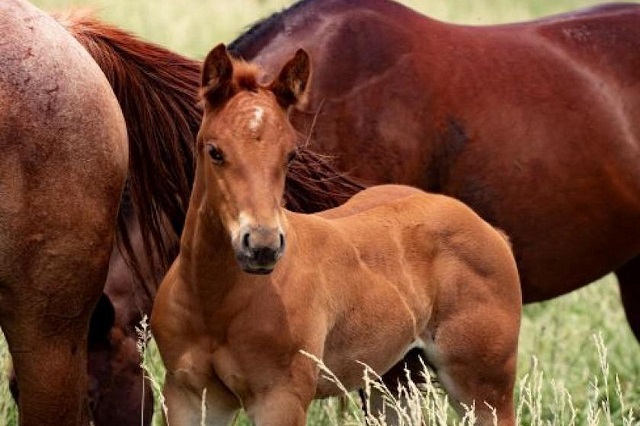Equine Glandular Gastric Disease (EGGD) affects the glandular portion of a horse’s stomach. As horse owners and caretakers, understanding the unique nutritional requirements of horses with EGGD is crucial for their well-being.
Understanding EGGD
Equine
Glandular Gastric Disease (EGGD) is a complex condition marked by inflammation
and ulceration in the glandular region of a horse's stomach. This ailment often
manifests through symptoms like decreased appetite, weight loss and poor
performance, underscoring the significant impact on the horse's overall
well-being. Addressing the challenges posed by EGGD necessitates a multifaceted
approach, and diet is thought to play less of a role in its development than
Equine Squamous Gastric Disease (ESGD). Factors such as stress and exercise may
be more closely linked to EGGD, but nutrition is still an important
consideration in the management of the condition.
A
part of managing EGGD lies in cultivating a balanced diet that actively
supports gastrointestinal health. A diet rich in fibre proves instrumental, as
it not only aids in promoting regular digestion but also stimulates saliva
production. Saliva, acting as a natural buffer against gastric acid, becomes a
crucial element in mitigating the harsh effects on the stomach.
Additionally,
the incorporation of forage into the equine diet emerges as a fundamental
strategy to maintain a healthy digestive system. Among the various forage
options, high-quality fibre feeds, such as alfalfa, shine as a particularly
beneficial choice. Alfalfa
is high in quality protein and calcium, which can help to buffer acid in the
stomach, so it is a good choice for horses prone to EGGD.
The Top 4 Benefits of Alfalfa-Based Horse Feed
for EGGD
1.
Rich
in Nutrients - Alfalfa stands out as an excellent option for
horses with EGGD due to its richness in nutrients. It is a high-protein fibre
feed, providing essential amino acids necessary for muscle development and
overall health. The calcium content in alfalfa also contributes to reducing
acidity in the stomach.
2.
Improved
Digestibility - Alfalfa is highly digestible, which means it
is easier for the horse to break down the fibre and extract the energy from it.
This means that alfalfa provides a similar energy level to a basic coarse mix
but with significantly lower levels of starch, so is a preferable choice for
horses with EGGD.
3.
Enhanced
Saliva Production - Saliva acts as a natural buffer against gastric
acid, helping to protect the stomach lining. Adding chopped alfalfa to the
bucket feed can help to increase chew time, leading to increased saliva
production.
4.
Natural
Buffering Effect - Beyond its role in enhanced saliva production,
alfalfa-based horse feed provides a natural buffering effect in the stomach.
The high levels of calcium and protein it provides can help to counterbalance
the acidity in the stomach. This natural buffering effect is beneficial for
horses with EGGD, as it can help to reduce the risk of gastric ulcers and
provide further support in managing the condition effectively. A recent study
found that clinical success for horses with EGGD was 47.7 times more likely in
horses fed alfalfa compared to a control group (Julliand et al., 2023).
How to Manage EGGD Through a Balanced Diet
1.
Balancing
the Diet - Achieving a balanced diet is crucial for
horses with EGGD. In addition to alfalfa-based feed, the addition of a suitable
balancer or broad spectrum vitamin and mineral supplement can create a
well-rounded nutritional plan alongside plenty of forage. Consult with an
equine nutritionist to tailor the diet to your horse's specific needs,
considering factors such as age, weight, and activity level.
2.
Frequent,
Small Meals - Instead of feeding large meals, opt for
smaller, more frequent feedings throughout the day. This approach helps prevent
prolonged periods of an empty stomach and helps to promote continued saliva
production. Feeding plenty of forage can also encourage natural chewing and saliva
production, promoting gastric health.
3.
Hydration
is Key - Adequate water intake is vital for horses
with EGGD. An inadequate supply of water has been shown to increase the
likelihood of gastric ulcers, so ensure that clean, fresh water is readily
available at all times. For horses who may not be drinking enough, dampening
the feed can further increase water consumption and contribute to overall
hydration.
Managing
EGGD requires an approach that includes proper nutrition tailored to the
specific needs of affected horses. Alfalfa-based horse feeds are a valuable
part of this strategy, offering a range of benefits. By understanding the
nutritional considerations for EGGD and implementing a well-balanced diet,
horse owners can contribute to the overall well-being and performance of their
equine companions.

